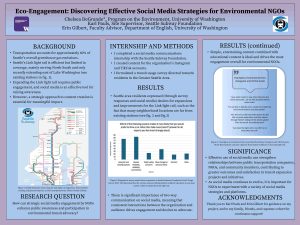Eco-Engagement: Discovering Effective Social Media Strategies for Environmental NGOs
Seattle’s Link light rail provides numerous benefits for its residents and visitors. However, its limited number of stations and frequently delayed expansion efforts significantly reduces its accessibility. This study aims to evaluate the feelings and opinions of Seattle residents regarding public transportation, and what combination of social media strategies most effectively increase engagement from this audience. To complete this study, I worked as a Social Media Communications Intern with the Seattle Subway Foundation, which is an all-volunteer non-profit organization that advocates for and motivates transit expansion, particularly for the Link light rail. Along with gathering insights from social media feedback, I published a transit usage survey, which received 121 responses. This feedback and responses allowed me to analyze the preferences of Greater Seattle Area residents regarding public transportation and the effectiveness of various social media strategies. The insights gathered revealed a significant desire for increased transit options and more rapid expansion efforts, particularly in underserved neighborhoods. Additionally, the data demonstrated the necessity for a balanced approach to social media content, combining educational posts with engaging, visually appealing materials to drive community involvement. Ultimately, this study demonstrates that strategic social media engagement not only raises awareness about transit issues but also fosters a more participatory dialogue between environmental NGOs and the public, demonstrating the importance of two-way communication. By leveraging these findings, organizations like the Seattle Subway Foundation can enhance their outreach efforts and continue to successfully advocate for sustainable and equitable transit expansion.
